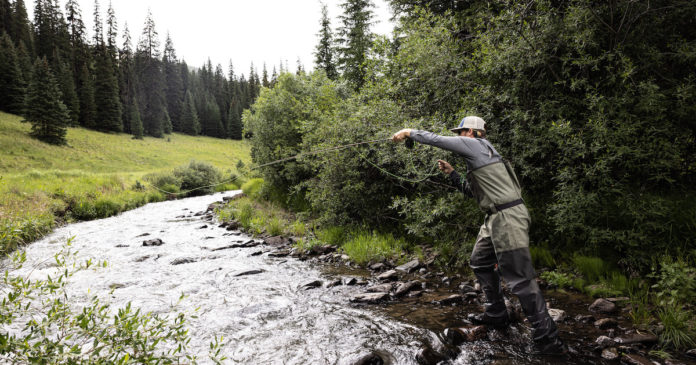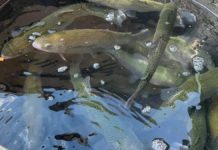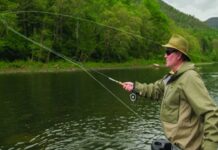It’s easy to feel like an outsider, especially when it comes to hunting and fishing. I know because I’ve been one. I remember asking (what I thought were reasonable) questions about where to hunt on various forums, only to get some snide or sarcastic reply that essentially amounted to “screw off.” Now, years later, I have a few opinions on that matter, now that I’ve had to ignore those comments and find my own places to hunt and fish.
The truth of the matter is that there’s nothing more valuable than information when it comes to the outdoors. I don’t care if you shoot bismuth or cast a four-figure fly rod. Unless you know where and how to follow your pursuit, you could have all the tools in the world and nowhere to use them. It’s why there’s a constant arms race in hunting and angling fueled by two parties—those with the information and those without it.
In short, information is one hell of a precious commodity, and it’s becoming more and more valuable as public lands become more and more crowded. In 2021, anglers bought 39 million fishing licenses, and hunters bought over 15 million hunting licenses, which adds up to about 16 percent of the population, most of which would love to know where you spotted those wood ducks dive-bombing through the timber last week.
Sure, there are about 700 million acres of public hunting land across the country, but once you remove the top 10 states (by acres of public land) from the equation, you’re only looking at somewhere around 70 million acres. That leaves those who live in states like Massachusetts, Oklahoma, and Maryland competing over relative scraps.
So, with all of this in mind, I’ve come to the conclusion (as you probably have, too) that we should do our best to keep the honey holes and loafing areas to ourselves. It’s not only good for us but also helps reduce pressure on the places for wildlife to congregate.
But back to my forum friends for a minute. How do we keep these locations secret without being a jerk about it? It turns out that it’s easier said than done, but I’ve come up with a few personal rules that keep me from turning the informational arms race into a full-blown conflict.
Take Out the Ego
Step one: remember that at one point you were the hunter or angler without the information, and no one likes a sore winner. Nothing’s worse than having an angler talk about their incredible day on the water only to give you the cold shoulder when you ask them where they were.
If you’re going to keep a tight lid on a location, then don’t go on and on about how great that location is. It’s in poor taste and it’s obnoxious. Just live with the personal satisfaction that you’ve put in the work to get yourself to success.
Give Them a Reason
In most cases, including my own at one point, hunters and anglers are simply ignorant as to why we keep locations secret. Without gloating or talking down, offer some reasons as to why you won’t share.
As I mentioned, if we told everyone about our favorite spots, then it probably wouldn’t be our favorite spot for long because it’s either too crowded and/or the wildlife has moved on to another secret location.
Give Them a Way
One surefire way to avoid looking like a douche is to actually help someone find their own locations. Show them how to read maps and use layers on onX, the behavior and movement patterns of their target, or how water access laws work in their area.
It may seem like an empty gesture at the time, but they simply don’t know the satisfaction and success that comes from putting in the time and effort to solve the puzzle on their own. Help them put the pieces together.
Share Strategically
Here’s a crazy idea: you can actually share some locations. This works in a few different ways. First, you can use the art of misdirection, offering a location that may actually be a decent option but isn’t your secret location. Just don’t be the person who sends novice hunters and anglers on wild goose chases, either. That’s just mean.
Second, if this person has put in the work or earned your trust, maybe consider letting them in on the secret. This all depends on who they are and what the location can handle, but why not share a spot with someone who values it and protects it as well as you do? I know I have a (very) short list of hunters with whom I’d point in the right direction if they asked me. They made that list because I trust them to also keep a secret, hunt or fish it ethically, and help me kick up a few doves while they’re at it.
All’s Fair in Love and War
Lastly, we all need to remember that when it comes to public land: it’s, well, public. You may think you’ve just discovered El Dorado, but chances are there’s someone else who probably knows about it already, and they also think they’ve discovered El Dorado. You’re not that special and neither am I. So, relax. If you run into someone else on the river, there are always going to be other days and other locations. It’s not worth losing your cool over. They’ve probably put in just as much time and effort to get to that point as you have, and the early bird gets the worm. Give them space and tell them good luck.
Like so many other aspects of life, there’s a paradox that exists between difficulty and enjoyment. Too many hunters and anglers think the key to their outdoor happiness is shooting more birds, catching more fish, and being “successful.” But, if they’re handed the key to that success, it’s going to be shallow.
Experienced outdoorsmen and women know that real success comes with learning the land, studying the species, and putting all of the pieces together. They know that going through the suck will, eventually, make them a better (and happier) angler and hunter, and that has nothing to do with bag limits. So, next time someone tries to mine you for information, just be nice and try to empathize with them. You have the key to happiness already, and it’s pretty damn hard to find on a map.
Credit: Source link






























